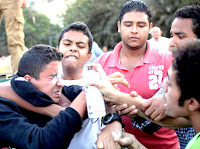Times of Israel This post is a response to “Nachlaot, where pedophiles roam free,” by Elana Kutscher. In it, I examine the main points made by Elana and analyze their validity.
Elana claims that there are pedophiles in Jerusalem’s Nachlaot neighborhood and that this was reported to the police over a year ago, but that the pedophiles are still there. The implication is that the police did not really do enough about the problem.
On the contrary, the police took immediate action as soon as they were notified about the initial suspected pedophile in November 2010. Afterwards, when neighborhood residents reported more suspects in the summer of 2011, the police again took action and arrested a group of suspects. If anything, the police were overzealous in their pursuit of potential suspects. They arrested several more individuals in January, 2012, simply because of public pressure, even though there was no substantive evidence.
Elana claims that there are pedophiles in Jerusalem’s Nachlaot neighborhood and that this was reported to the police over a year ago, but that the pedophiles are still there. The implication is that the police did not really do enough about the problem.
On the contrary, the police took immediate action as soon as they were notified about the initial suspected pedophile in November 2010. Afterwards, when neighborhood residents reported more suspects in the summer of 2011, the police again took action and arrested a group of suspects. If anything, the police were overzealous in their pursuit of potential suspects. They arrested several more individuals in January, 2012, simply because of public pressure, even though there was no substantive evidence.
She states that the police say this is the largest pedophile ring in the history of Israel, and that over 100 children have been abused.
In fact, the position of the police is that there is NOT a pedophile ring in Nachlaot at all – and there is not a ringleader. The police DO believe that there were pedophiles molesting children in Nachlaot, but that each one acted on an individual basis, and not as part of an organized group. The concept of a pedophile ring was the figment of the over-active imaginations of worried parents. They also claimed that this imaginary pedophile ring was producing movies of pedophilia for financial profit. No such movies were ever found. No forensic evidence of any sexual molestation was ever found either, even for those suspects who were indicted. The indictments were based entirely on the testimony of the children.
Not all the children who gave testimony were actually abused. Though more than 100 children testified that they were abused, much of that testimony was corrupted by the improper methods the parents used to obtain it. Some mothers went door to door, trying to convince as many parents as possible that their children were molested. The children were also shown pictures of the suspected pedophiles. [...]
In fact, the position of the police is that there is NOT a pedophile ring in Nachlaot at all – and there is not a ringleader. The police DO believe that there were pedophiles molesting children in Nachlaot, but that each one acted on an individual basis, and not as part of an organized group. The concept of a pedophile ring was the figment of the over-active imaginations of worried parents. They also claimed that this imaginary pedophile ring was producing movies of pedophilia for financial profit. No such movies were ever found. No forensic evidence of any sexual molestation was ever found either, even for those suspects who were indicted. The indictments were based entirely on the testimony of the children.
Not all the children who gave testimony were actually abused. Though more than 100 children testified that they were abused, much of that testimony was corrupted by the improper methods the parents used to obtain it. Some mothers went door to door, trying to convince as many parents as possible that their children were molested. The children were also shown pictures of the suspected pedophiles. [...]


_1a.jpg)



